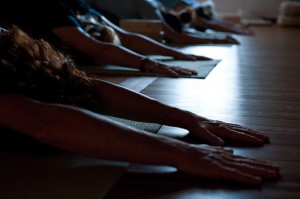 NPR’s Margot Adler reports on the current popularity of yoga in the United States, and its disassociation with Hinduism. She explores the perception of yoga as a form of relaxation and physical exercise, contrasting this with the efforts of the Hindu American Foundation to “take back yoga.” Some American Hindus claim that something important is lost when yoga is understood narrowly, that is, without the importance philosophy and lifestyle have for its practice:
NPR’s Margot Adler reports on the current popularity of yoga in the United States, and its disassociation with Hinduism. She explores the perception of yoga as a form of relaxation and physical exercise, contrasting this with the efforts of the Hindu American Foundation to “take back yoga.” Some American Hindus claim that something important is lost when yoga is understood narrowly, that is, without the importance philosophy and lifestyle have for its practice:
“What we’re trying to say is that the holistic practice of yoga goes beyond just a couple of asanas [postures] on a mat. It is a lifestyle, and it’s a philosophy,” Shah says.
“How do you lead your life in terms of truthfulness? And nonviolence? And purity? The lifestyle aspect of yoga,” Shah says, “has been lost.”
Scholarly debate, meanwhile, contests that yoga technically predates canonical Hinduism, and that there is no “one” yoga:
“The genius of yoga,” she says, is that it’s “accessible to all. It’s very important to not overstress the Hindu origins of yoga. And at the same time, nobody should dismiss the vast importance that Hinduism has played in the evolution of yoga over the centuries,” West says…
The Hindu American Foundation’s Shah says these discussions alone show the Take Back Yoga campaign is working.
Read or listen to the full story at NPR.













Interesting questions. See also my article on intellectual property rights and yoga.
Intellectual Property Rights (IPRs) related to traditional knowledge (TK) have been controversial and there has been accusations of bio-piracy and unauthorized appropriation of TK in the form of patents etc. There were reports that patents on Yoga had been granted by U.S. Patent and Trademark Office but this was later denied. Patents on accessories, devices that enable practice and teaching of Yoga have been granted. Similarly there many trademarks related to Yoga have been granted. The copyright claims of the founder of Bikram Yoga have been controversial and the cases on these copyright claims have been settled out of court. Yoga with origins in India has become part of global consumer culture and has been transformed into what is called as ‘transnational yoga’. Hence it has many meanings in different contexts. This article addresses the controversies and discusses the complexities involved in intellectual property rights related to Yoga.